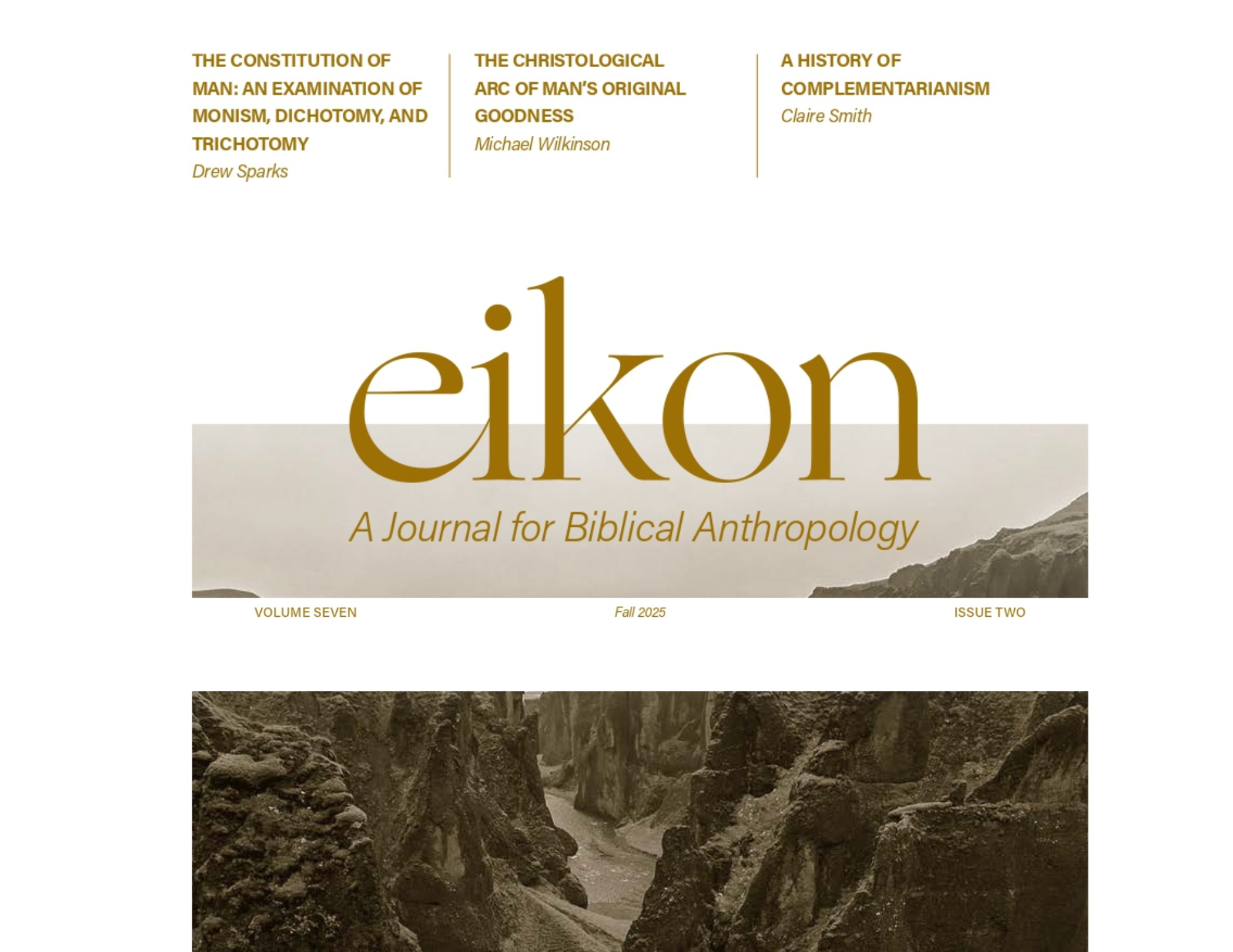
Editor’s Note: The following editorial appears in the Fall 2025 issue of Eikon.
What is man?
What is man? There is little doubt that this is the primary question of our age. And it is one that the Bible not only asks (Psalm 8), but provides a definitive answer. Yet, modern man has largely rejected its wisdom, and we encounter the destructive consequences daily.
Downstream from the denial of God’s definition of man lie the grim realities not merely tolerated, but promoted in our culture. We see such realities in the wanton disregard for life in abortion, euthanasia, and the destruction of human embryos used for IVF and scientific study — the latter of which comes with the promise of societal “advancement.” We see it in our culture’s re-conception of sex, from a good to be enjoyed within marriage for both intimacy and to beget a family, to a mere expression of one’s individual desires.
From this transformation came the radical redefinition of marriage, moving from a procreative union to one of self-fulfillment. No longer is marriage — a covenantal commitment between husband and wife — considered the irreplaceable, foundational institution from which families are formed and strong communities built. Thanks to our technological evolution, we no longer need such a passé view of marriage, not with IVF and surrogacy on hand to make and purchase babies-on-demand.
In all of this, the ironic, dual degradation and commodification of children, as objects of either inconvenience or luxury, stands out in the contrast between both abortion and surrogacy.
Along the way we slowly, then suddenly, began to redefine ourselves entirely. Through progressive waves of feminism, we made man and woman socially interchangeable; through the sexual revolution, we made man and women sexually interchangeable; through cultural revolution, the sexual revolutionaries completed their capstone project by mainstreaming the “T” in LGBT. Transgenderism has now made man and women ontologically interchangeable.
For this reason, transgenderism has stood out as the definitive icon of our culture’s confusion over what it means to be human. This confusion evinces itself in the dissolution of definitions for man and woman. We literally can no longer define what a woman is. And since we can no longer define what a woman is, we go a step further and dismantle related designations, such as “mother,” and replace them with more “inclusive” (i.e., politically correct) terms, such as the intentionally gender-ambiguous, “birthing person.” All of this proves G.K. Chesterton correct when he wrote that “It’s the first effect of not believing in God that you lose your common sense, and can’t see things as they are.”[1]
While we wish we were merely dealing with words, the truth is that these words — and the ideas they represent — have wounded, maimed, and sterilized untold numbers of children and adults and destroyed countless families. Ideas really do have consequences. And as it turns out, sowing ideas that run contrary to our nature ends up reaping destruction on that nature when fully lived out. Given these self-evident truths, we need no prophet to predict the truth that the surgical and chemical mutilation, especially among the youngest members of society, will in the future be judged a very dark period of our history. And it will be judged with greater condemnation, given that so many “experts” threw caution to the wind and aided and abetted the proliferation of such abject evil.
When man becomes god
But perhaps I may suggest an even more ghoulish representative for the loss of biblical anthropology in our times: transhumanism. Whereas transgenderism blurs the essential differences between man and woman, transhumanism obliterates human nature entirely. Taking Charles Darwin’s naturalistic materialism and Silicon Valley’s technological utopianism to their logical conclusions, transhumanism proposes a future where humans no longer exist, or at least no longer exist in the way we understand today.
Transhumanist thinkers such Yuval Noah Harari predict that mankind will “transcend” the “biologically determined limits” of natural selection and become gods.[2] Triumphally, Harari writes,
Having secured unprecedented levels of prosperity, health and harmony, and given our past record and our current values, humanity’s next targets are likely to be immortality, happiness and divinity. Having reduced mortality from starvation, disease and violence, we will now aim to overcome old age and even death itself. Having saved people from abject misery, we will now aim to make them positively happy. And having raised humanity above the beastly level of survival struggles, we will now aim to upgrade humans into gods, and turn Homo sapiens into Homo deus.[3]
To do so, man must revolutionize the course of history. Having allegedly evolved over the course of four-billion years through natural selection, man will now transcend this biologically determined order and become a god. As Harari contends, we are “now beginning to break the laws of natural selection, replacing them with the laws of intelligent design.”[4] In sum, mankind will move from created to creator. I hope you see the illogical hubris here.
But what will this mean for mankind? And what of human nature? While the metaphysics are necessarily blurry, mankind is set to be replaced by something else entirely:
Unless some nuclear or ecological catastrophe destroys us first, the pace of technological development will soon lead to the replacement of Homo sapiens by completely different beings who possess not only different physiques, but also very different cognitive and emotional worlds….beings with emotions and identities like ours will no longer exist, and our place will be taken by alien life forms whose abilities dwarf our own.[5]
Since man, according to the transhumanist, is but one stop on the evolutionary railway of natural selection, we should expect that he will at some point evolve into something unrecognizable. But the extraordinary claim of transhumanism is that man will no longer be subject to “biologically determined limits,” but instead, “breaking free” of these (seemingly formerly deterministic) limits, man will become intelligent, god-like designers of a new species.[6] According to Harari, this transfiguration will take place slowly, as man merges with forthcoming hardware and software technology:
Homo sapiens is likely to upgrade itself step by step, merging with robots and computers in the process, until our descendants will look back and realise that they are no longer the kind of animal that wrote the Bible, built the Great Wall of China and laughed at Charlie Chaplin’s antics. This will not happen in a day, or a year. Indeed, it is already happening right now, through innumerable mundane actions. Every day millions of people decide to grant their smartphone a bit more control over their lives or try a new and more effective antidepressant drug. In pursuit of health, happiness and power, humans will gradually change first one of their features and then another, and another, until they will no longer be human.[7]
Although a remarkable prediction, we should perhaps not be shocked that those who believe there is “nothing special about humans”[8] evolving over billions of years through natural selection would also maintain that man could again be evolved and ultimately erased by “superhumans”[9] or “godlings.”[10] In an evolutionary worldview, “human nature” can only refer to a snapshot of time in an unending process of gradual transformation. And when life is defined as mere “data processing,”[11] we should not be surprised to find transhumanist prophets musing that “life will break out into the vastness of the inorganic realm” as some kind of legitimate analog to human life.[12]
In the end, where transgenderism blurs the line between man and woman, transhumanism blurs the line between man and machine, degrading man to a data processor — an “obsolete algorithm.”[13]
Foundations for anthropology
As stated above, each of these truly dystopian distortions of human nature flow from a rejection of God and his Word. Over the past two centuries in the Western world, it has become apparent that Satan, having attacked on the battlefield these two foundations, is now waging a most gruesome war on human nature.
Protestants have for centuries understood that all true knowledge rests on these two foundations (principia) — God and his Word.[14] For apart from God’s being, we have no existence. And apart from his self-revelation to us, we can have no “sufficient, certain, and infallible”[15] knowledge of God and all things in relation to him.[16] Thus, God himself forms the ontological foundation for all being and knowledge. This conviction flows from the truth that our Triune Lord is God of himself, eternally-existing and the giver of life to all creation. As God has life in himself and grants it to his creatures, so too God has all knowledge in himself and communicates this knowledge to his creatures. Just as his divine life is the basis for our life, so too his divine knowledge forms the basis for our finite knowledge. And just as we do not share his divine being, neither do we share his divine knowledge. Our knowledge, as we say, is accommodated and analogical. While it is true knowledge, we know it as creatures, whereas God knows all things as God.
And insofar as man sets himself in opposition to them, he will find himself not only in idolatry, but self-destruction. And that is exactly what we are seeing today. Apart from the objective Being behind all things and his objective Word to reveal and define them, man is left to the miseries of his own contrivance.
The contrivances of feminism and egalitarianism have erased our social order and established walls of hostility between the sexes; homosexuality denies our sexual complementarity, demeans the body, and redefines marriage and the family; transgenderism bends reality by severing the connection between sex and gender, alienating our bodies from our sense of self[17]; and transhumanism paradoxically dehumanizes and deifies human nature by degrading him to an impersonal information processor. Each of these, in their own way, denies God and his intention for humanity and leads us down the road of demeaning and destroying ourselves. And make no mistake, we are destroying ourselves. The epidemic of depression, loneliness, anxiety, and suicide represent symptoms of a culture that has suppressed the knowledge of God and turned inward to the labyrinth of the self as the measure of all things. Apart from God and the light of his revelation, there is no escaping such a nihilistic maze.
Since its founding, CBMW has sought to teach the truth about men and women, revealed in both nature and Scripture, acknowledging that such truths are ultimately grounded in God and his Word. We dedicate this issue to continuing that tradition by focusing on key doctrinal commitments that form a critical starting point for understanding the critical anthropological issues of our time. We hope that in doing so, we will further anchor our anthropological applications in God’s enduring revelation.
[1] G.K. Chesterton, “The Oracle of the Dog,” in The Incredulity of Father Brown (London: Cassell and Company, 1926), 105.
[2] Yuval Noah Harari, Sapiens: A Brief History of Humankind (New York, NY: Harper, 2015), 397.
[3] Yuval Noah Harari, Homo Deus: A Brief History of Tomorrow (New York, NY: Harper, 2017), 21.
[4] Harari, Sapiens, 397.
[5] Harari, Sapiens, 412.
[6] Harari, Sapiens, 397.
[7] Harari, Homo Deus, 49.
[8] A larger portion of the context is worth quoting: “There was nothing special about humans. Nobody, least of all humans themselves, had any inkling that their descendents would one day walk on the moon, split the atom, fathom the genetic code and write history books. The most important thing to know about prehistoric humans is that they were insignificant animals with no more impact on their environment than gorillas, fireflies, or jellyfish.” Harari, Sapiens, 4 (emphasis added).
[9] Harari, Sapiens, 403, 410.
[10] Harari, Homo Deus, 44.
[11] Harari, Homo Deus, 386–387.
[12] Harari, Homo Deus, 45.
[13] Harari, Homo Deus, 387.
[14] For more on the principia of theology, see Richard A. Muller, Dictionary of Latin and Greek Theological Terms: Drawn Principally from Protestant Scholastic Theology, 2nd ed. (Grand Rapids, MI: Baker Academic), 288–290; Louis Berkhof, Systematic Theology, (Grand Rapids, MI: Eerdmans, 1996) I:93–97; Herman Bavinck, Reformed Dogmatics: Volume 1: Prolegomena (Grand Rapids, MI: Baker Academic, 2003), 210–214; for a more recent exposition of these ideas, see Stephen J. Wellum, Systematic Theology: From Canon to Concept: Volume 1 (Brentwood, TN: B&H Academic, 2024), 85–105.
[15] Second London Baptist Confession 1689/77, 1.1, https://www.the1689confession.com/1689/chapter-1.
[16] This wording is close to that of Stephen Wellum, who defines systematic theology as “the orderly, comprehensive ‘study of the triune God’ and all things in relationship to him.” Wellum, Systematic Theology, 6.
[17] See Nancy Pearcey, Love Thy Body: Answering Hard Questions About Life and Sexuality (Grand Rapids, MI: Baker Books, 2018).
Ben: pull quote
Share This Article



